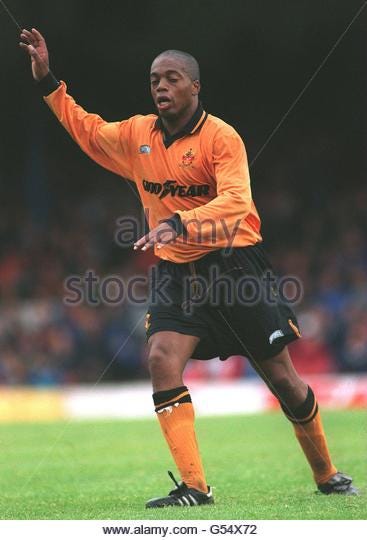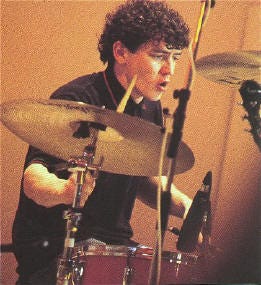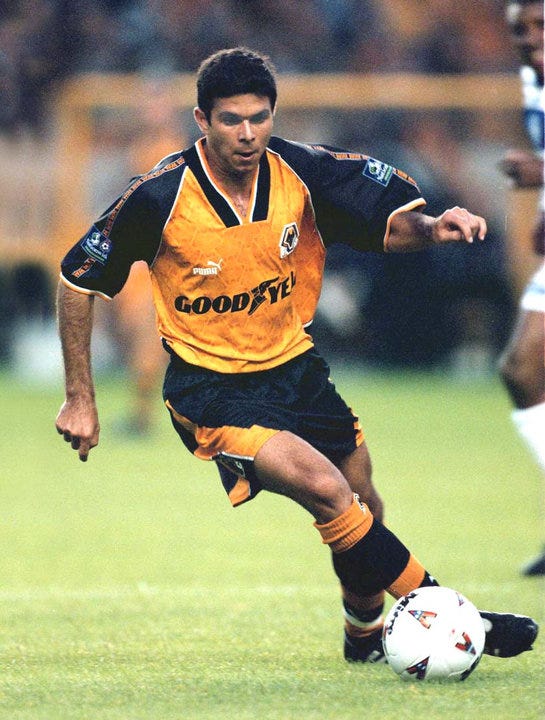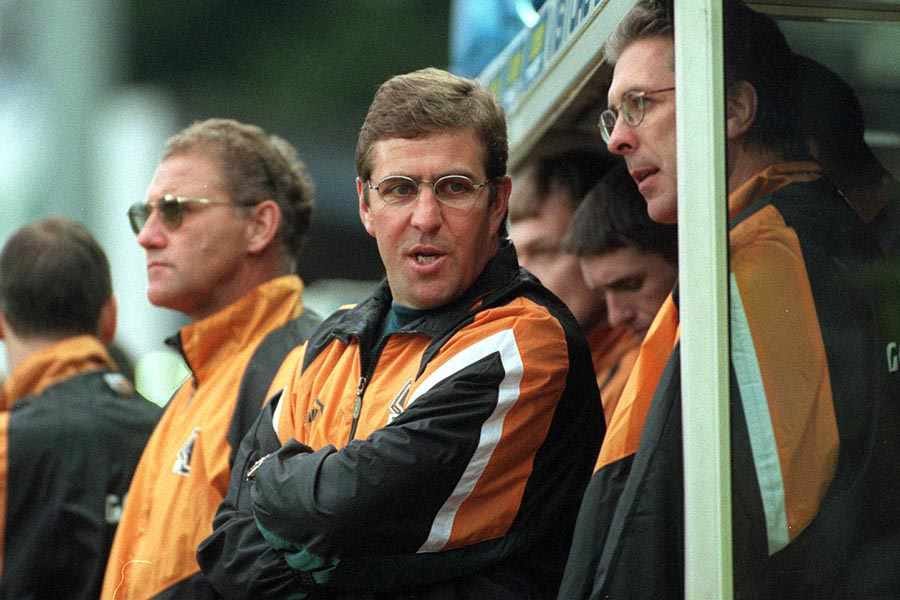THE 12 DAYS OF CHRISTMAS TAT : #4 : MARK ATKINS
In the same bracket as World Cup winner Roque Junior
#4: MARK ATKINS
Signed: September 1995 from Blackburn, £1,000,000
Appearances: 155
Goals: 12
Left: June 1999, contract expired
He was: A box full of coffee-flavoured Quality Street
As was to become a familiar theme for around a decade for Wolves, we failed to gain promotion in 1994/5 despite heavy investment on the squad. Our falling short could in part be attributed to serious injuries to a number of key players, all set to return for the following season, so in theory only small tweaks were required to the squad to enable us to make a further challenge for the big prize. Having signed in December 1994, Don Goodman had struggled to earn a regular place up front, unable to dislodge the partnership of Steve Bull (when available) and David Kelly, and was therefore consigned to an unfamiliar right wing berth in his first six months at the club. However, he began the 1995/6 season as first choice alongside Bull and started off extremely well; this in turn pushing the previous season's top scorer in Kelly back down to the bench. As the opening month of the season went on it was apparent that Kelly would be the odd man out and the decision was made to sell him on. As negotiations progressed with Sunderland on a deal worth around £1,000,000, the projected funds were made available to Graham Taylor to add to the squad as he saw fit.
In yet another familiar scene, central midfield had probably been our weakest area in 1994/5. Gordon Cowans had made a surprisingly decent contribution since signing in December 1994 but with him turning 37, his days were clearly going to be short-lived. Mark Rankine had finished the season in central midfield (around four half-decent games right at the end somehow convincing the Official Supporters' Club to name him Player of the Year – this was possibly even more of a farce of an award than Matt Doherty winning it last season. I'm still fuming about it now, 21 and a half years on) but was unable to retain his place and was sold on to Preston North End early on in the season.

Player of the Year. I ask you.
Meanwhile a division higher, reigning Premier League champions Blackburn Rovers had their own version of the Kelly/Goodman issue rearing its head; David Batty had missed virtually the entire title winning season and this had allowed for Mark Atkins to play a regular part, however the clearly superior Batty was now back fit and firmly in possession of the shirt. This left Atkins out in the cold and with the money available to spend with the Kelly deal now done, Taylor decided to snap him up for around the same fee. On the face of it, it appears to be reasonably sensible management. Sell on a striker (soon to turn 30) who you aren't really using and is currently at a high value thanks to last season's exploits, and bring in a midfielder where you're presently weak, all at a net cost of virtually nothing. As ever, the devil is in the detail.
There were two main issues with this transfer. Firstly, back in 1995, not only was the state of British indie music immeasurably better, but £1m was still a sizeable amount of money in footballing terms, especially in the second tier. Rather than spending all that money on one player, we should have been looking to sign two or three, possibly of a younger profile, possibly from a lower level, and look to develop them. This is fairly standard procedure for us and many clubs these days but back then the principle seemed to be completely lost on Wolves. Secondly, what we were lacking in central midfield (and had been for some time) was individual quality, we had a handful of competent players (plus Darren Ferguson) but no real spark. We also didn't really have a dedicated defensive midfielder at the time – although Neil Emblen was a converted centre-half, he always looked better when driving forward and didn't ever have the discipline to be used as a holding player. Anyone watching Atkins at Blackburn would have known that he filled none of these gaps. He had very, very simple instructions in an extremely well-drilled team – give it to someone better. That someone better in this case generally being Tim Sherwood who may (in fact, does) come across as a total buffoon nowadays, the epitome of the Proper Football Man who doesn't have time for 'analysis', 'tactics' or 'using the English language correctly', but back in the mid 90s was a very good Premier League midfielder. We were bringing Atkins in at a fee and with a status as a current title winner that meant we were expecting him to be the star. To take the division by storm. Like if someone had hired Tony McCarroll after he left Oasis and made him lead guitarist and singer. It just wasn't ever going to happen, that was not his skillset. Moreover, with the state of our midfield, there was no-one “better” to give the ball to.

Having the same haircut as David Starsky is rarely a characteristic of successful drummers.
Atkins' first season at Wolves was utterly nondescript on a personal level, as he looked every inch an uninspiring central midfielder with no stand out skill whatsoever. The team as a whole struggled badly; when you have a manager who plays primarily “results first” football as Graham Taylor did throughout his entire career, when those results turn bad and there is no style or pattern to fall back on, things can get ugly very quickly. Taylor was sacked in November with us 18th in the league on 18 points from 16 games, a long way from where we were expected to be, although he did on departure make the puzzling boast that he left us “still in all three competitions”, as if not getting knocked out of the FA Cup when we hadn't entered it yet was an achievement. Mark McGhee took over during the following month and while Atkins still got his fair share of games, the arrivals of Simon Osborn and Steve Corica meant he was by no means guaranteed a shirt. Wolves limped to 20th place in the end and this dreadful finish – which would turn out to be our lowest for nearly two decades until a certain Welshman got involved, let's call him Dean S. No, that's too obvious. Let's go with D.Saunders – would inevitably lead to changes in the squad for the following season, making Atkins' position ever more precarious.

Alarm bells really should be ringing if this bloke is getting a game ahead of you.
What you should always remember about football managers is that most of them aren't really capable of original thought. Frequently, they see a good idea somewhere else and they copy it. Arsenal had a lot of success back in the early 90s with near post corners flicked on, and suddenly everyone was doing that for a couple of years. Jose Mourinho builds a system of only playing one up front, as the (as then) best manager in the world is doing it, everyone else does it. Even if they don't have Didier Drogba up front to make it work. So with Euro 96 dominated by 3-5-2 systems, it was of no great shock to see Mark McGhee decide that he'd copy that approach at Wolves for the 1996/7 season. In anticipation of this, he signed Adrian Williams and Keith Curle to play at centre-half, only for both to pick up injuries in pre-season. McGhee was committed to playing in this way so brought Mark Venus back into the first team fold after it initially looked like he was on his way out of the club, and decided to employ Atkins as a sweeper in that three man defence. It must be said that he didn't do a terrible job in that role, but realistically it was as low pressure as it gets. The bulk of the actual defending was left to the two genuine centre-halves and given his ability on the ball, he was hardly going to be striding forward out of defence or launching attacks with pinpoint passing in the way that say, David Luiz currently does for Chelsea. Essentially, he was just an extra body with a bit of aerial ability in there to facilitate us playing with wing-backs. When Curle returned in the second half of the season he switched between this role and midfield as McGhee started to mix and match between a back three and a back four. Once again we missed out on promotion with a playoff defeat, this time at the hands of Crystal Palace, though Atkins did manage to score in the ultimately fruitless home leg of the tie.

It might be cynical on my part, but I don't necessarily believe that this brains trust came up with tactics all on their own.
He was used very much as a utility player in his final two seasons at Wolves, deployed at times as an orthodox centre-half, back as sweeper, in his natural central midfield role and most often in his final months at the club, at right back. He became our very own Jack of all trades, master of none as he would fill in semi-competently in all these roles without ever looking anything like a serious long-term option wherever he was playing. He was released at the end of his contract after the 1998/9 season and his decline in stature was marked out by him only being able to secure a three month deal with fourth tier York City for the following campaign. When that deal expired, he dropped further, into the Conference with Doncaster Rovers where he stayed for 18 months. The summer of 2001 saw a move to Shrewsbury Town where he saw out the final two seasons of his professional career in the fourth tier though it was rounded off by relegation from the Football League in 2002/3. He played one further year of non-league football for Harrogate Town before retiring as a player in 2004. His post-playing career has been dominated by a six year spell between 2008 and 2014 as manager of Matlock Town.

Premier League winner in 1995, relegated to the Conference in 2003. A similar career trajectory to Noel Edmonds at the time.
Although Mark Atkins was not a complete disaster of a player – in as much as did contribute along the way in a fairly unspectacular manner – his signing was a criminal use of the money available to us and endemic of the way in which Wolves would simply chase “names” in the mid 1990s rather than using effective scouting or accurately focusing on where and how we needed strengthening. There were so many players that we missed out on during this period because all of our focus was on the same areas, the same profile pursued time and time again with the same results. Our central midfield needed a lot of things back in September 1995. It did not need Mark Atkins.



